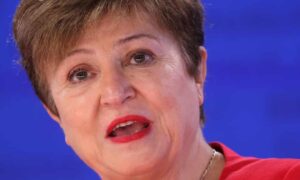
Russia’s war with Ukraine is stoking geopolitical tensions and damaging the recovery prospects of the global economy, the head of the International Monetary Fund has warned.
Kristalina Georgieva urged an end to the two-year conflict, saying it was both a human tragedy and a barrier to growth.
As G7 finance ministers said they were looking at ways of using the almost $300bn (£240bn) of seized Russian assets to help Ukraine, the IMF managing director said support for Kyiv remained “steady and firm”. Georgieva said Ukraine would need $42bn of financial support this year.
The G7 group of leading developed countries said it would “continue working on all possible avenues by which immobilised Russian sovereign assets could be made use of to support Ukraine, consistent with international law and our respective legal systems”.
The communique released after the meeting in Washington also hinted at tougher sanctions against Iran following last weekend’s missile and drone attack on Israel.
“We will ensure close coordination of any future measure to diminish Iran’s ability to acquire, produce, or transfer weapons to support its destabilising regional activities,” the G7 said.
Most of the seized Russian assets are being held in Europe, and the European Central Bank is concerned that outright seizure would result in tit-for-tat retaliation from Moscow and may contravene international law.
One idea being pursued is to pull forward the interest payments on frozen Russian assets – estimated at between €3bn to €5bn (£2.6bn to £4.3bn) a year – so that they can be used as collateral for loans or bonds to support Ukraine.
The UK chancellor, Jeremy Hunt, said the G7 had reluctantly concluded that the war in Ukraine was not going to end any time soon and would require a longer term commitment.
Georgieva said the sooner the conflicts in Ukraine and in Gaza ended the better it would be for the global economy.
“The war in Ukraine is a tragedy for its people. Having men, women and children killed and wounded is a daily occurrence. We need to end this war for their sake and for the sake of the world economy,” she said.
Six months of fighting between Israel and Hamas had meant Gaza’s economy had been “wiped out”, Georgieva said. “Eighty per cent of it is gone. The West Bank has also been impacted.”
Speaking at a press conference at the IMF’s spring meeting, Georgieva said: “The world has grappled with multiple shocks – the pandemic, a cost of living crisis, war and conflict, and climate disasters. The twenties has already been a turbulent decade.”
